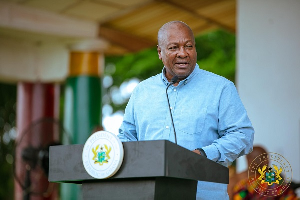Kumasi, July 27, GNA - All district government hospitals in the Ashanti region will by the end of 2007 provide Anti Retroviral Treatment (ART) to People Living with HIV/AIDS (PLWHAs). Presently, Komfo Anokye Teaching Hospital (KATH), Bomso Hospital, Obuasi Government Hospital, Anglogold Hospital, also at Obuasi and the Kumasi South Hospital are providing ART services to AIDS patients in the region.
By September this year, the hospitals in Pramso and Offinso will also join in the provision of the ART services, according to Mr Michael Boamey, Ashanti Regional Co-ordinator of the National AIDS Control Programme.
He was speaking at the opening of a two-day advocacy meeting on the Prevention of Mother to Child Treatment (PMTCT) and Voluntary Counselling and Testing (VCT) for health managers in the region in Kumasi on Wednesday.
He said there were now 28 ART sites throughout the country with all the regional hospitals participating in the programme. Mr Boamey said only 5,000 out of the current 71,000 PLWHAs who needed ART were receiving the treatment, but added that 16,000 of them were expected to access the treatment by December this year. He reiterated that ART was not a cure for the disease but it tries to prevent opportunistic diseases in order to prolong the life of the infected persons.
He said the PMTCT and VCT idea was adopted in 2003 as way of limiting the spread of the diseases, especially among children and women in the region. The Regional Co-ordinator said by April 2005, 34 health institutions had been accredited to provide PMTCT/VCT services in the region.
He said 211 general nurses and midwives had also been trained for the programme in the region. Dr Kofi Asare, Ashanti Regional Director of Health Services said the PMTCT/VCT programme should include fathers since they played a crucial role in the management of the disease. He appealed to Ghanaians to avail themselves to the VCT services to enable them know their HIV status in order to seek early treatment if they were infected. 27 July 06
Health News of Thursday, 27 July 2006
Source: GNA












